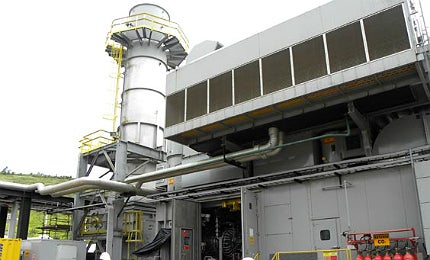On 19 January 2010, Brazil‘s state-owned company Petrobras launched the world’s first ethanol-fired power plant. Situated in the city of Juiz de Fora, in the state of Minas Gerais, approximately 180km north of Rio de Janeiro, the plant generates electricity on a commercial scale using sugar cane-derived ethanol. The plant’s technology, engineering and field support was provided by General Electric (GE).
The plant has an installed capacity of 87MW, which is enough to power a city of 150,000 inhabitants. It is connected to Brazil’s electricity grid and has power supply contracts for the next ten years.
Ethanol plant process and turbines / generators
The plant is a simple-cycle, natural gas-type equipped with two GE LM6000 aero-derived combustion turbines and Alstom generators. In order to enable the use of ethanol, one of the 43.5MW-powered combustors was converted by GE. Following the successful commissioning of the first turbine conversion Petrobras awarded GE another contract in October 2010 to convert the second turbine of the plant.
The turbine conversion involved replacing combustion chambers and injector nozzles along with installing peripheral equipment, such as a receipt system, tanks, pumps and filters. The dual fuel feature improved the plant’s energy security and reliability.
Testing at Petrobras’s Brazilian power plant
A five-month demonstration test was conducted by Petrobras under an agreement with GE to validate ethanol as an alternative source of fuel and confirm that emission levels are within expected limits.
The demonstration was carried out in three phases. The first and second phases evaluated engine performance and environmental impact, respectively. In the third phase the performance of the equipment when running on ethanol was investigated and examined. The testing was completed in May 2010. The test results revealed no difference in turbine performance.
Environmental impact of the ethanol-fired facility
During the tests, the plant demonstrated significantly lower CO2 emissions and water usage. Between 31 December 2009 and 13 January 2010, the plant demonstrated a 30% reduction in nitrogen oxide (Nox) emissions within 150 hours of power generation with ethanol. In comparison with natural gas and diesel-fired plants, the plant releases lower Nox levels without lowering its power generating capacity.
To measure NOx, carbon oxide and sulphide oxide emissions, the Centre for Natural Gas and Renewable Energies Technologies installed a monitoring station in the Juiz de Fora thermal power generation park. The park has an installed capacity of 7,028MW.
Brazil’s energy market and needs
In 2009, Brazil had 106GW of installed power capacity. The power requirements of the country are met primarily through hydroelectricity. In 2009, the total electric power consumption was around 67.4GW, approximately 85% of which was met through hydroelectricity.
In order to meet its growing electricity requirements, by 2020 Brazil will have to increase its electricity generation capacity by 50%. The hydroelectric power generation system in Brazil is highly seasonal and results in frequent blackouts. Thermoelectric power generation is used as a backup during the summer.
In 2009, approximately 3.2GW of electricity was generated by thermoelectric power plants. Typical thermal generating sources include natural gas, petroleum products and coal.
Ethanol is an emerging low-carbon alternative of electricity generation in Brazil, which is the second-largest ethanol producer in the world. In 2008, Brazil produced 26.9 billion litres of ethanol. The country initiated the use of ethanol as a substitute for automobile fuel in the 1970s when it established the Proalcool programme.
Related content
Brazil’s bold move – slashing costs to revitalise an electric economy
One of the most dynamic emerging economies of recent years, Brazil has gone to some extreme lengths to protect itself from a near perfect storm of economic dangers.
Smart grid solutions to Latin America’s power theft crises
Power theft is a major issue in Latin America where illegal hook ups and black market siphoning costs economies billions each year.








.gif)
